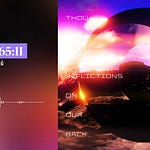For they have destroyed the things which thou hast made: but what has the just man done? (Psalm 10:4 DR)
A common theme in many of the Psalms is the seeming prosperity of the wicked in this life over against the injustice and persecution that the righteous must undergo. This ofttimes vexing situation cannot be papered over by pious platitudes, and the Psalmist gives voice to this difficulty in many places, perhaps most famously in Psalm 72:
How good is God to Israel, to them that are of a right heart! But my feet were almost moved; my steps had well nigh slipped. Because I had a zeal on occasion of the wicked, seeing the prosperity of sinners. (Psalm 72:1-3 DR)
There is a fitting echo or parallel here, for in Psalm 72 he begins by describing the goodness of God towards His people and those who are righteous, which is then contrasted with the vexation that nearly causes him to lose his faith when he sees the prosperity of sinners. Here in Psalm 10 the order is reversed, for he sees the destruction that the wicked have wrought in respect to the laws and ordinances of God—those who have prepared to shoot in the dark the upright of heart—and then moves on to ask rhetorically what the just have done to deserve such treatment.
That is, why do the righteous seem to bear the brunt of the displeasure of God as manifested in their suffering, whereas the wicked who are actively defying God and tearing down His Church seem to be allowed to perpetuate their wickedness, and—even worse—seem to prosper because of it?
This yet again returns to the opening temptation to get thee away from hence to the mountain, which is to apostatize from Christ and His Church, to look for Him elsewhere or give in to despair at righteousness ever profiting the man whose way is just. The parallel with Psalm 72 comes out yet again, as the Psalmist sees the world around him give voice to his complaint:
And they said: How doth God know? and is there knowledge in the most High? Behold these are sinners; and yet abounding in the world they have obtained riches. And I said: Then have I in vain justified my heart, and washed my hands among the innocent. And I have been scourged all the day; and my chastisement hath been in the mornings. (Psalm 72:12-14 DR)
When those around him see the wicked prospering, they begin to ask if God even cares, or if indeed the wicked are truly wicked, since they seem to prosper, and why shouldn’t that be taken as a sign of God’s approbation? The temptation to get thee away from hence to the mountain comes to the forefront again, as the Psalmist asks within himself whether he has in vain justified my heart and washed my hands among the innocent. It is not that he does not desire innocence or justification, but rather that on the surface of things they seem to profit him nothing. For not only do the wicked seem to prosper, but his only reward seems to be chastisement and scourgings. In other words, the wicked have destroyed the things which thou hast made, but what has the just man done?
St. Augustine, as usual, reads this passage Christologically, seeing this passage ultimately having its end in our Lord Jesus Christ. For while the just often suffer in this life, our Lord was perfectly innocent in all His ways and never guilty of any sin, yet suffered at the hands of the wicked and ultimately was put to death. Yet in all these sufferings and affronts He did not retaliate or strike back, nor was He in any way helpless, for He has the power to lay down His life and take it up again. He demonstrated in His own perfect life—and therefore in His own perfect suffering—His obedience to the will of the Father, as St. Paul states:
Who in the days of his flesh, with a strong cry and tears, offering up prayers and supplications to him that was able to save him from death, was heard for his reverence. And whereas indeed he was the Son of God, he learned obedience by the things which he suffered: And being consummated, he became, to all that obey him, the cause of eternal salvation. (Hebrews 5:7-9 DR)
St. John Chrysostom remarks that this passage sets forth the wonders of our Lord’s condescension in His Incarnation, for while in His divine nature He certainly cannot suffer, in union with His human nature in the hypostatic union He brings to perfection this suffering in obedience which is both to bring about our salvation and to serve as the exemplar of our own obedience to the will of the Father:
He learned, he says, to obey God. Here again he shows how great is the gain of sufferings. And having been made perfect, he says, He became the Author of salvation to them that obey Him. But if He, being the Son, gained obedience from His sufferings, much more shall we. Do you see how many things he discourses about obedience, that they might be persuaded to it? For it seems to me that they would not be restrained. From the things, he says, which He suffered He continually learned to obey God. And being made perfect through sufferings. This then is perfection, and by this means must we arrive at perfection. For not only was He Himself saved, but became to others also an abundant supply of salvation. For being made perfect He became the Author of salvation to them that obey Him. (St. John Chrysostom, Homily 8 on Hebrews)
In light of our Lord’s sufferings, the Psalmist’s question here is brought to consummation, for although the wicked who persecuted our Lord attempted to destroy the things which Thou hast made, yet He as the just One was truly one Who had done nothing to deserve it, yet undertook these sufferings willingly in obedience to the Father’s will for the sake of our salvation.
The Psalmist in Psalm 72 begins to understand this, for after lamenting the prosperity of the wicked and the distress of the just, he steps outside of himself and his limited perspective to take a higher view:
If I said: I will speak thus; behold I should condemn the generation of thy children. I studied that I might know this thing, it is a labour in my sight: Until I go into the sanctuary of God, and understand concerning their last ends. (Psalm 72:15-17 DR)
When he goes into the sanctuary of God, he begins to see the plight that vexes him in a new light, for he no longer sees things according to the paradigm of this world or in holding the blessings and goods of this world as the highest good to attain. Instead, he goes into the sanctuary of God, and only there begins to understand. The things of this world immediately take on secondary importance in light of God’s presence in the sanctuary, which for the Psalmist is a prefiguring of Christ in His Church, preeminently His True and Substantial Presence in the Holy Eucharist.
The sacrifice of the Mass is something to which we join the sacrifice of our own lives, and as no student is greater than his master, so in joining ourselves to Christ in His Body the Church, we take upon ourselves the same obedience to God’s will that He did, willing to undergo suffering in imitation and union with His obedience. St. Paul says that this obedience occurred in that He was Son, and those who have been made adopted sons of God will share in His sufferings as sons that such might be likewise perfected in them to bring about their salvation:
And you have forgotten the consolation, which speaketh to you, as unto children, saying: My son, neglect not the discipline of the Lord; neither be thou wearied whilst thou art rebuked by him. For whom the Lord loveth, he chastiseth; and he scourgeth every son whom he receiveth. Persevere under discipline. God dealeth with you as with his sons; for what son is there, whom the father doth not correct? But if you be without chastisement, whereof all are made partakers, then are you bastards, and not sons… Now all chastisement for the present indeed seemeth not to bring with it joy, but sorrow: but afterwards it will yield, to them that are exercised by it, the most peaceable fruit of justice. (Hebrews 12:5-8, 11 DR)
I grabbed a nice image of the earth and brought it into After Effects creating a precomp. I drew a bunch of little masks onto duplicates of the precomp to create all the little pieces. I could have used CC Shatter, but I wanted more control over each piece. Once the masks were drawn I used AutoCrop to crop the preocmps to the masks to make it easier to work with.
I then animated the explosion of the pieces and used KeyStone to even out the motion after the initial movement, and then reanimated them back into the original places. I parented these all to a Null and used that for the overall animation to and from.
In the background blended a bunch of abstract textures and applied a Wiggle Hold to the position and rotation to give it a random and frenetic look.
I placed the text behind the earth image and applied Shadow Studio to it to get some separation from the background.
I finally added in some color correction and slight distortion effects.
Enjoy.
For they have destroyed the things which thou hast made: but what has the just man done?
(Psalm 10:4 DR)
View a higher quality version of this gif here:













Share this post